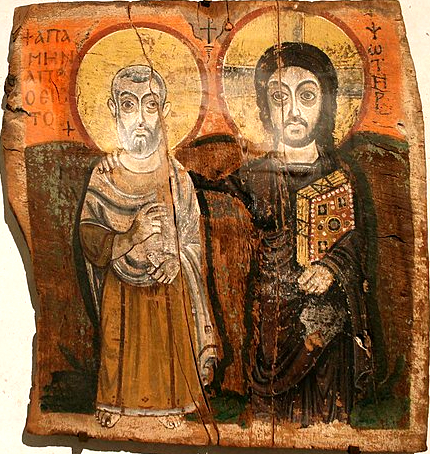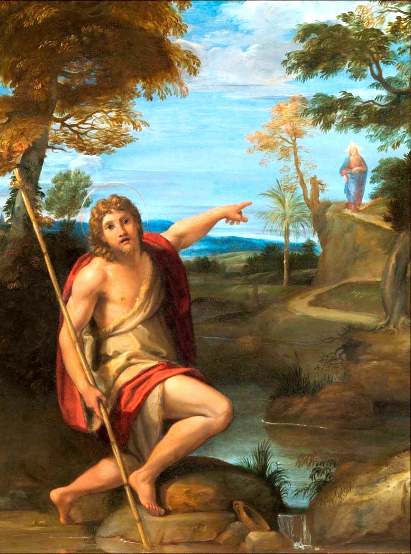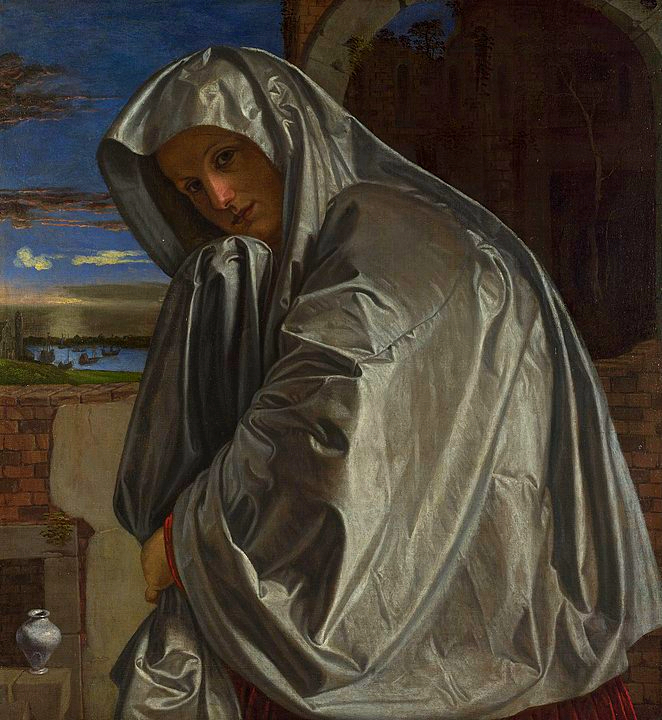Translation of the Holy Gospel According to Luke
Now in the fifteenth year of the reign of Tiberius Caesar, Pontius Pilate being governor of Judea, and Herod being tetrarch of Galilee, and Philip his brother tetrarch of Iturea and the country of Trachonitis, and Lysanias tetrarch of Abilina, under the high-priests Annas and Caiphas: the word of the Lord was made unto John, the son of Zachary, in the desert. And he came into all the country about the Jordan, preaching the baptism of penance for the remission of sins, as it was written in the book of the sayings of Isaias the prophet: A voice of one crying in the wilderness: Prepare ye the way of the Lord: make straight His paths: every valley shall be filled: and every mountain and hill shall be brought low, and the crooked shall be made straight, and the rough ways plain: and all flesh shall see the salvation of God.
From Pope Saint Leo The Great, Sermon XXVI. On the Feast of the Nativity
The Saviour, dearly beloved, is born not of fleshly seed but of the Holy Spirit, in such wise that the condemnation of the first transgression did not touch Him. And hence the very greatness of the boon conferred demands of us reverence worthy of its splendour. For, as the blessed Apostle teaches, we have received not the spirit of this world but the Spirit which is of God, that we may know the things which are given us by God: and that Spirit can in no other way be rightly worshipped, except by offering Him that which we received from Him. But in the treasures of the Lord’s bounty what can we find so suitable to the honour of the present feast as the peace, which at the Lord’s nativity was first proclaimed by the angel-choir? For that it is which brings forth the sons of God, the nurse of love and the mother of unity: the rest of the blessed and our eternal home; whose proper work and special office it is to join to God those whom it removes from the world. Whence the Apostle incites us to this good end, in saying, being justified therefore by faith let us have peace towards God.
In which brief sentence are summed up nearly all the commandments; for where true peace is, there can be no lack of virtue. But what is it, dearly beloved, to have peace towards God, except to wish what He bids, and not to wish what He forbids? For if human friendships seek out equality of soul and similarity of desires, and difference of habits can never attain to full harmony, how will he be partaker of divine peace, who is pleased with what displeases God and desires to get delight from what he knows to be offensive to God? That is not the spirit of the sons of God; such wisdom is not acceptable to the noble family of the adopted. That chosen and royal race must live up to the dignity of its regeneration, must love what the Father loves, and in nought disagree with its Maker, lest the Lord should again say: I have begotten and raised up sons, but they have scorned Me: the ox knoweth his owner and the ass his master’s crib: but Israel hath not known Me and My people hath not acknowledged Me.
The mystery of this boon is great, dearly beloved, and this gift exceeds all gifts that God should call man son, and man should name God Father: for by these terms we perceive and learn the love which reached so great a height. For if in natural progeny and earthly families those who are born of noble parents are lowered by the faults of evil intercourse, and unworthy offspring are put to shame by the very brilliance of their ancestry; to what end will they come who through love of the world do not fear to be outcast from the family of Christ? But if it gains the praise of men that the father’s glory should shine again in their descendants, how much more glorious is it for those who are born of God to regain the brightness of their Maker’s likeness and display in themselves Him Who begat them, as saith the Lord: Let your light so shine before men that they may see your good works and glorify your Father which is in heaven? We know indeed, as the Apostle John says that the whole world lieth in the evil one, and that by the stratagems of the Devil and his angels numberless attempts are made either to frighten man in his struggle upwards by adversity or to spoil him by prosperity, but greater is He that is in us, than he that is against us, and they who have peace with God and are always saying to the Father with their whole hearts thy will be done can be overcome in no battles, can be hurt by no assaults. For accusing ourselves in our confessions and refusing the spirit’s consent to our fleshly lusts, we stir up against us the enmity of him who is the author of sin, but secure a peace with God that nothing can destroy, by accepting His gracious service, in order that we may not only surrender ourselves in obedience to our King but also be united to Him by our free-will.

Christ and Abbot Menas, Icon, 8th Cent.
For if we are like-minded, if we wish what He wishes, and disapprove what He disapproves, He will finish all our wars for us, He Who gave the will, will also give the power: so that we may be fellow-workers in His works, and with the exultation of Faith may utter that prophetic song: the Lord is my light and my salvation: whom shall I fear? the Lord is the defender of my life: of whom shall I be afraid?


